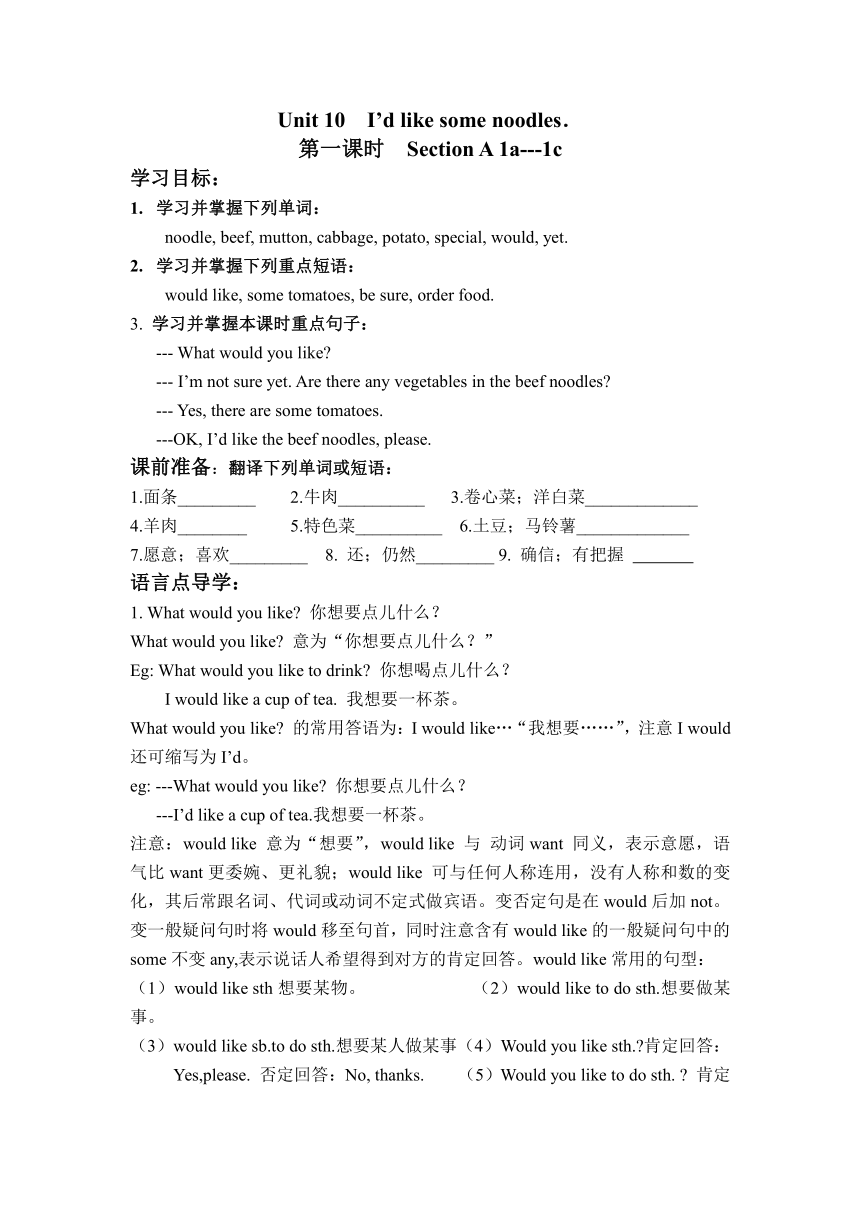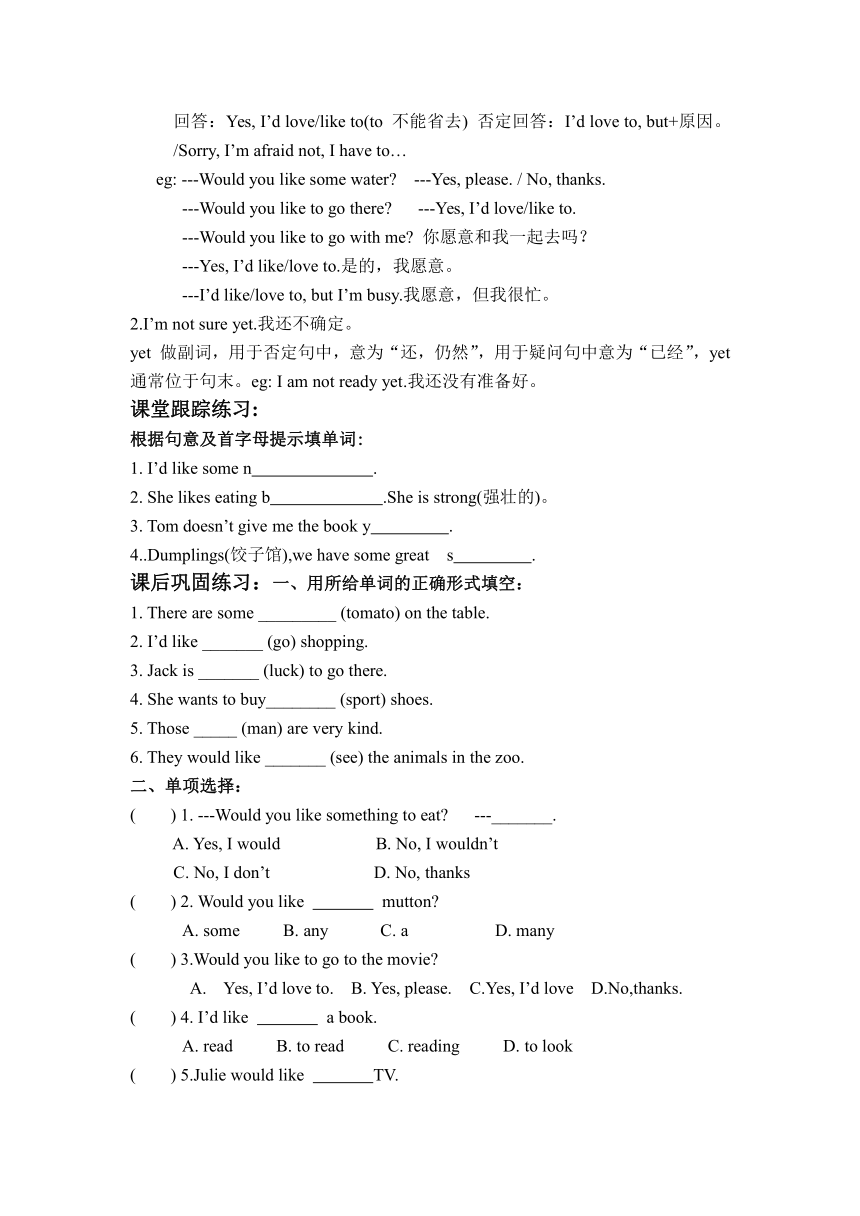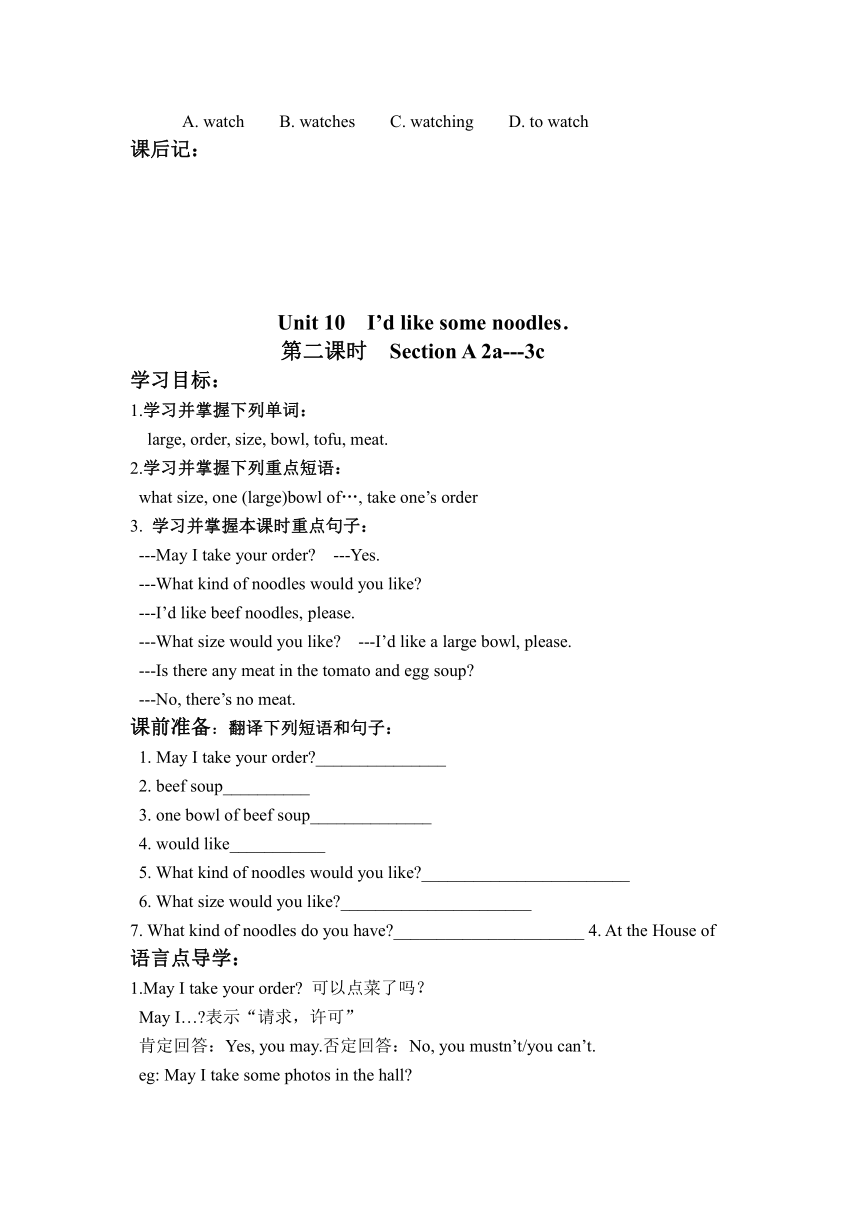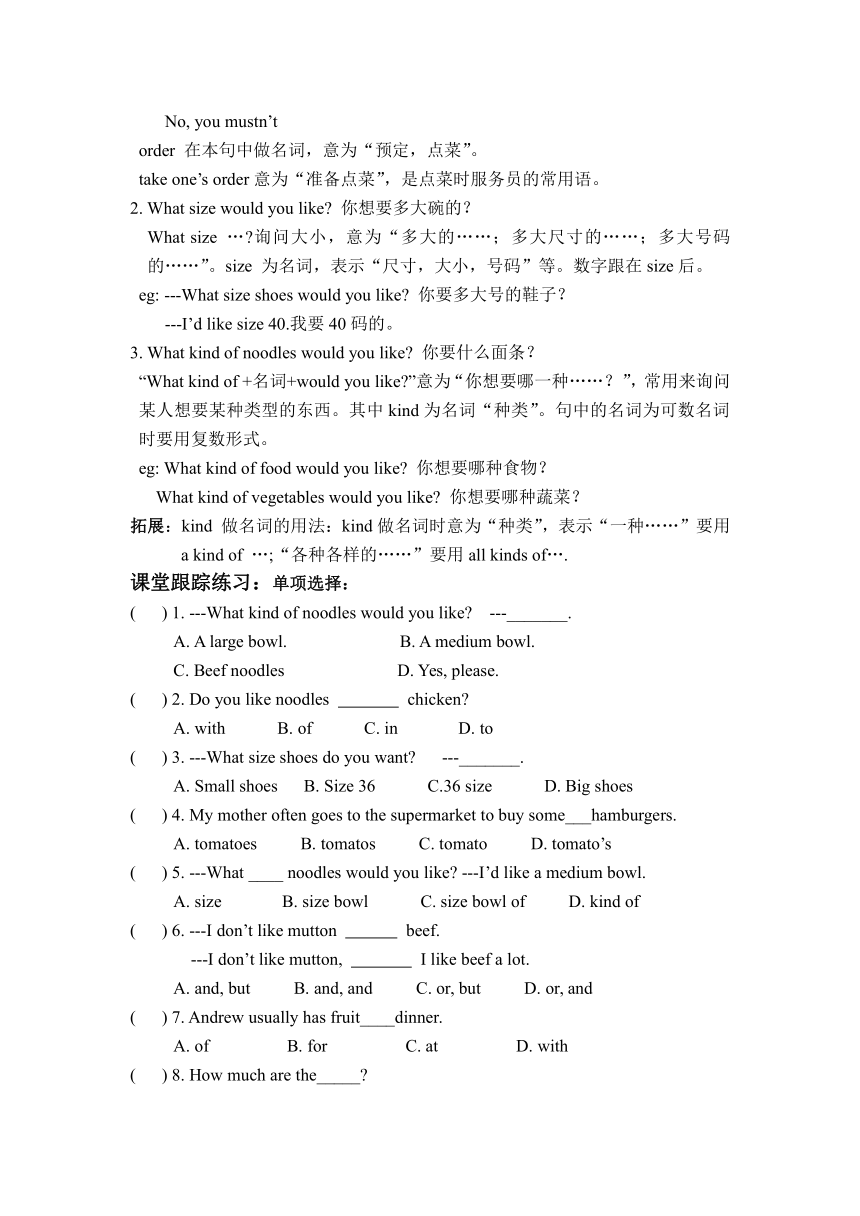Unit 10 I’d like some noodles.单元学案 (4课时)
文档属性
| 名称 | Unit 10 I’d like some noodles.单元学案 (4课时) |  | |
| 格式 | zip | ||
| 文件大小 | 15.8KB | ||
| 资源类型 | 教案 | ||
| 版本资源 | 人教新目标(Go for it)版 | ||
| 科目 | 英语 | ||
| 更新时间 | 2015-03-25 18:14:01 | ||
图片预览




文档简介
Unit 10 I’d like some noodles.
第一课时 Section A 1a---1c
学习目标:
学习并掌握下列单词:
noodle, beef, mutton, cabbage, potato, special, would, yet.
学习并掌握下列重点短语:
would like, some tomatoes, be sure, order food.
3. 学习并掌握本课时重点句子:
--- What would you like
--- I’m not sure yet. Are there any vegetables in the beef noodles
--- Yes, there are some tomatoes.
---OK, I’d like the beef noodles, please.
课前准备:翻译下列单词或短语:
1.面条_________ 2.牛肉__________ 3.卷心菜;洋白菜_____________
4.羊肉________ 5.特色菜__________ 6.土豆;马铃薯_____________
7.愿意;喜欢_________ 8. 还;仍然_________ 9. 确信;有把握
语言点导学:
1. What would you like 你想要点儿什么?
What would you like 意为“你想要点儿什么?”
Eg: What would you like to drink 你想喝点儿什么?
I would like a cup of tea. 我想要一杯茶。
What would you like 的常用答语为:I would like…“我想要……”,注意I would还可缩写为I’d。
eg: ---What would you like 你想要点儿什么?
---I’d like a cup of tea.我想要一杯茶。
注意:would like 意为“想要”,would like 与 动词want 同义,表示意愿,语气比want更委婉、更礼貌;would like 可与任何人称连用,没有人称和数的变化,其后常跟名词、代词或动词不定式做宾语。变否定句是在would后加not。变一般疑问句时将would移至句首,同时注意含有would like的一般疑问句中的some不变any,表示说话人希望得到对方的肯定回答。would like常用的句型:
(1)would like sth想要某物。 (2)would like to do sth.想要做某事。
(3)would like sb.to do sth.想要某人做某事(4)Would you like sth. 肯定回答:Yes,please. 否定回答:No, thanks. (5)Would you like to do sth. 肯定回答:Yes, I’d love/like to(to 不能省去) 否定回答:I’d love to, but+原因。/Sorry, I’m afraid not, I have to…
eg: ---Would you like some water ---Yes, please. / No, thanks.
---Would you like to go there ---Yes, I’d love/like to.
---Would you like to go with me 你愿意和我一起去吗?
---Yes, I’d like/love to.是的,我愿意。
---I’d like/love to, but I’m busy.我愿意,但我很忙。
2.I’m not sure yet.我还不确定。
yet 做副词,用于否定句中,意为“还,仍然”,用于疑问句中意为“已经”,yet通常位于句末。eg: I am not ready yet.我还没有准备好。
课堂跟踪练习:
根据句意及首字母提示填单词:
1. I’d like some n .
2. She likes eating b .She is strong(强壮的)。
3. Tom doesn’t give me the book y .
4..Dumplings(饺子馆),we have some great s .
课后巩固练习:一、用所给单词的正确形式填空:
1. There are some _________ (tomato) on the table.
2. I’d like _______ (go) shopping.
3. Jack is _______ (luck) to go there.
4. She wants to buy________ (sport) shoes.
5. Those _____ (man) are very kind.
6. They would like _______ (see) the animals in the zoo.
二、单项选择:
( ) 1. ---Would you like something to eat ---_______.
A. Yes, I would B. No, I wouldn’t
C. No, I don’t D. No, thanks
( ) 2. Would you like mutton
A. some B. any C. a D. many
( ) 3.Would you like to go to the movie
A. Yes, I’d love to. B. Yes, please. C.Yes, I’d love D.No,thanks.
( ) 4. I’d like a book.
A. read B. to read C. reading D. to look
( ) 5.Julie would like TV.
A. watch B. watches C. watching D. to watch
课后记:
Unit 10 I’d like some noodles.
第二课时 Section A 2a---3c
学习目标:
1.学习并掌握下列单词:
large, order, size, bowl, tofu, meat.
2.学习并掌握下列重点短语:
what size, one (large)bowl of…, take one’s order
3. 学习并掌握本课时重点句子:
---May I take your order ---Yes.
---What kind of noodles would you like
---I’d like beef noodles, please.
---What size would you like ---I’d like a large bowl, please.
---Is there any meat in the tomato and egg soup
---No, there’s no meat.
课前准备:翻译下列短语和句子:
1. May I take your order _______________
2. beef soup__________
3. one bowl of beef soup______________
4. would like___________
5. What kind of noodles would you like ________________________
6. What size would you like ______________________
7. What kind of noodles do you have ______________________ 4. At the House of
语言点导学:
1.May I take your order 可以点菜了吗?
May I… 表示“请求,许可”
肯定回答:Yes, you may.否定回答:No, you mustn’t/you can’t.
eg: May I take some photos in the hall
No, you mustn’t
order 在本句中做名词,意为“预定,点菜”。
take one’s order意为“准备点菜”,是点菜时服务员的常用语。
2. What size would you like 你想要多大碗的?
What size … 询问大小,意为“多大的……;多大尺寸的……;多大号码的……”。size 为名词,表示“尺寸,大小,号码”等。数字跟在size后。
eg: ---What size shoes would you like 你要多大号的鞋子?
---I’d like size 40.我要40码的。
3. What kind of noodles would you like 你要什么面条?
“What kind of +名词+would you like ”意为“你想要哪一种……?”,常用来询问某人想要某种类型的东西。其中kind为名词“种类”。句中的名词为可数名词时要用复数形式。
eg: What kind of food would you like 你想要哪种食物?
What kind of vegetables would you like 你想要哪种蔬菜?
拓展:kind 做名词的用法:kind做名词时意为“种类”,表示“一种……”要用a kind of …;“各种各样的……”要用all kinds of….
课堂跟踪练习:单项选择:
( ) 1. ---What kind of noodles would you like ---_______.
A. A large bowl. B. A medium bowl.
C. Beef noodles D. Yes, please.
( ) 2. Do you like noodles chicken
A. with B. of C. in D. to
( ) 3. ---What size shoes do you want ---_______.
A. Small shoes B. Size 36 C.36 size D. Big shoes
( ) 4. My mother often goes to the supermarket to buy some___hamburgers.
A. tomatoes B. tomatos C. tomato D. tomato’s
( ) 5. ---What ____ noodles would you like ---I’d like a medium bowl.
A. size B. size bowl C. size bowl of D. kind of
( ) 6. ---I don’t like mutton beef.
---I don’t like mutton, I like beef a lot.
A. and, but B. and, and C. or, but D. or, and
( ) 7. Andrew usually has fruit____dinner.
A. of B. for C. at D. with
( ) 8. How much are the_____
A. potato B. potatos C. potatoes D. potato’s
( ) 9. They have two bowls of noodles.
A. tomato and egg B. tomato and eggs
C. tomatoes and egg D. tomatoes and egg
( )10.—May I smoke here
---Sorry,you______ .Look at the sign “No smoking.”
A.can B. may not C.mustn’t D.needn’’t
课后记:
Unit 10 I’d like some noodles.
第三课时 Section B 1a—1d
学习目标:
1.学习并掌握下列单词:dumpling, porridge, onion, fish, pancake,
2.学习并掌握下列重点短语:match with, green tea, orange juice, complete the form, telephone number. around the world,
3. 学习并掌握本课时重点句子:
---I like dumplings, fish and orange juice.
---I don’t like onions, green tea or porridge.
课前准备:根据句意及首字母填空:
1. My favorite drink is orange j______________.
2. John likes Chinese food. He likes to eat d_________ very much.
3. Would you like green t_________
4. What s_______ shoes do you want
5. I’d like a b__________ of noodles.
语言点导学:
1. ---I like dumplings ,fish and orange juice.我喜欢水饺、鱼和橘汁。
“fish”作可数名词,意为“鱼、鱼类”。作不可数名词,意为“鱼肉”。
eg: There are many fishes in the pool. (可数) I want to eat some fish.(不可数)“orange” 作可数名词,意为“桔子”。作不可数名词,意为“桔子汁”。作形容词为“橘黄色的”. eg: Is there any orange in the bottle(瓶子)
I want to eat an orange. This is an orange coat.
2. I don’t like onions ,green tea or porridge.我不喜欢洋葱,绿茶和粥。
(1)and和or都表示“和,与”。and一般用于肯定句中,连接两个或多个并列成分。而or 一般用于否定句中,连接两个或多个并列成分。
( 2) or可以用于选择疑问句,表示“或者,还是”。请用and或or填空:
①I like singing ______ dancing.
②The boy doesn’t like singing _____ dancing.
③---Do you like singing _____ dancing ---Dancing.
课堂跟踪练习:单项选择:
( ) 1. --- Would you like some onions?--- ______________.
A. Yes, I would B. No, I wouldn’t
C. No, thanks D. Yes, you would
( ) 2. There is no bird cat in the tree.
A. and B. or C. also D. /
( ) 3. He would like ______ in the room.
A. live B. lives C. to live D. living
( ) 4. Jim doesn’t like tomatoes, potatoes______ cabbage.
A. and B. with C. or D. for
( ) 5. There some food on the table.
A. is B. are C. has D. have
课后巩固练习:从下列句子中选择适当的选项,补全对话:
(W=Waiter, A=Annie)
W: Hello, David’s restaurant! A: Hello, ___1_____
W: Sure. A: _______2________
W: What kind of hamburgers would you like A: ____3_____
W: We have beef,
chicken and fruit.
A: Beef, please.
W: OK. ____4__
A: No, thanks.
W: ____5___
A: 65 Bridge Street.
课后记:
Unit 10 I’d like some noodles.
第四课时 Section B 2a—self check
学习目标:
1.学习并掌握下列单词:world, answer, different, cake, candle, age, blow, if, will, the UK, candy, lucky, popular, idea.
2.学习并掌握下列重点短语:the number of, make a wish, blow out, come true, get popular, cut up, bring good luck to sb.different kinds of, be short of, order mutton noodles, put on, ask for the order, ask about.
3. 学习并掌握本课时重点句子:
---Would you like … ---We have … for …
--- You can try our … --- … is very good/delicious.
课前准备:用所给词的正确形式填空:
1. What would she like (eat)
2. He (not) have hamburgers.
3. I like koalas because they are (friend) and smart.
4. There are some (photo) in the book.
5. I can (go) shopping and nobody (know) me.
6. They would like ____________ (see) the animals in the zoo.
7. How many (dumpling) would you like
8. I’d like (go) shopping.
9. There are some ________ (tomato) and _______ (porridge) on the table.
翻译下列短语:
1.一些好的特色菜________________ 2.不同种类的水果_________________
3.抓住它___________________ 4.缺少鱼___________________
5.带上眼镜_________________ 6.要求点菜_________________
语言点导学:
1.The birthday person must make a wish and blow out the candles.过生日的人必须许个愿望,并吹灭蜡烛。make a wish 意为“许一个愿”wish 为名词“愿望”多指不太可能实现的愿望,而hope为“希望”,多指实现几率较大的愿望。
eg: She makes a wish on her birthday party.她在生日派对上许了一个愿望。
You mustn’t give up your hope .你不能放弃希望。
2. They bring good luck to the birthday person.它们给过生日的人带来好运。
bring 意为“带来,拿来”,常用结构为“bring sth to sb ,相当于bring sb sth ”意为把某物带给某人。与take(拿走,带走)相反。
eg: Can you bring my coat to me 你能把我的外套带来吗?
He brings me a new car model .他给我带来了一个新的汽车模型。
Please take your bag. 请把你的书包拿走。
Luck 名词,“运气”lucky 形容词,“幸运的” luckily 副词,“幸运地”通常放在句首,“幸运的是” 用来修饰整个句子。
eg:What a lucky guy you are! Good luck to you!
Luckily, We got on the bus in time.
3. The number of candles is the person’s age .蜡烛的数目是人的年龄。
the number of 意为“……的数量”,后跟可数名词复数,做主语时谓语动词
单数形式。
拓展:A number of意为“许多”,后跟可数名词复数,做主语时谓语动词用复数形式。
eg: Can you tell me the number of students 你能告诉我学生的数量吗?
The number of students in our class is 50.我们班学生的数量是50.
A number of students in our class work hard. 我们班许多学生学习努力。
4. But we are short of fish.但是我们缺少鱼。be short of 为固定搭配,意为“缺少,短缺”。反义词组为be rich in 有丰富的……;富于。
eg: We are short of money now. 目前我们缺少钱。
5.Ask for the order 要求点餐。ask for 意为“请求,要求”为固定搭配。后接名词做宾语。 eg: She asks for time to think this matter. 她要求给她时间来考虑这件事。
课堂跟踪练习:一、单项选择:
( ) 1. She’d ________ some beef noodles for lunch.
A. likes B. like C. have D. has
( ) 2. Would you like some _____________ ?
A. apples juice B. apple juices C. apple juice D. apples juices
( ) 3. There ______________ in the large bowls.
A. are some rices B. is some rice
C. has some egg D. have some noodles
( ) 4. Two glasses of orange juice _________ on the table .
A. are B. is C. have D. has
( ) 5. We are having a math lesson now, you must stop _______ music.
A. listen B. to listen C. listening to D. for listening
( ) 6. ---Would you like to have _______ coffee
---No, thanks. I don’t want _______ drinks now.
A. any, any B. any, some C. some, some D. some, any
( ) 7..There was a fire in the office yesterday,______,all the people were saved.
A. luck B. lucky C. luckily D. Good luck.
二、 用所给词的适当形式填空:
Would you like (go ) to have a picnic(野餐) tomorrow
What kind of (noodle) would you like
There (be) many birds singing in the tree.
I’d like (tomato) and (egg) noodles. What about you
My parents grow different (vegetable) in the garden.
What_____ the number of the students. (be)
There ____ a number of students on the playground. (be)
课后巩固练习:书面表达:
根据下列提示,写一篇50个词左右的短文,可适当拓展。
1.Mary, 美国人,现在住在北京。
2.她喜欢吃中国食物。
3.她想早餐吃饺子,午餐吃米饭、肉,晚餐吃面条。
___________________________________________________________________________________________________________________________________________________________________________________________________________
课后记:
A.I’d like to order some food, please.
B.Do you want any drinks
C.What kind of hamburgers do you have
D.I’d like some hamburgers.
E.Then what’s your address, please
第一课时 Section A 1a---1c
学习目标:
学习并掌握下列单词:
noodle, beef, mutton, cabbage, potato, special, would, yet.
学习并掌握下列重点短语:
would like, some tomatoes, be sure, order food.
3. 学习并掌握本课时重点句子:
--- What would you like
--- I’m not sure yet. Are there any vegetables in the beef noodles
--- Yes, there are some tomatoes.
---OK, I’d like the beef noodles, please.
课前准备:翻译下列单词或短语:
1.面条_________ 2.牛肉__________ 3.卷心菜;洋白菜_____________
4.羊肉________ 5.特色菜__________ 6.土豆;马铃薯_____________
7.愿意;喜欢_________ 8. 还;仍然_________ 9. 确信;有把握
语言点导学:
1. What would you like 你想要点儿什么?
What would you like 意为“你想要点儿什么?”
Eg: What would you like to drink 你想喝点儿什么?
I would like a cup of tea. 我想要一杯茶。
What would you like 的常用答语为:I would like…“我想要……”,注意I would还可缩写为I’d。
eg: ---What would you like 你想要点儿什么?
---I’d like a cup of tea.我想要一杯茶。
注意:would like 意为“想要”,would like 与 动词want 同义,表示意愿,语气比want更委婉、更礼貌;would like 可与任何人称连用,没有人称和数的变化,其后常跟名词、代词或动词不定式做宾语。变否定句是在would后加not。变一般疑问句时将would移至句首,同时注意含有would like的一般疑问句中的some不变any,表示说话人希望得到对方的肯定回答。would like常用的句型:
(1)would like sth想要某物。 (2)would like to do sth.想要做某事。
(3)would like sb.to do sth.想要某人做某事(4)Would you like sth. 肯定回答:Yes,please. 否定回答:No, thanks. (5)Would you like to do sth. 肯定回答:Yes, I’d love/like to(to 不能省去) 否定回答:I’d love to, but+原因。/Sorry, I’m afraid not, I have to…
eg: ---Would you like some water ---Yes, please. / No, thanks.
---Would you like to go there ---Yes, I’d love/like to.
---Would you like to go with me 你愿意和我一起去吗?
---Yes, I’d like/love to.是的,我愿意。
---I’d like/love to, but I’m busy.我愿意,但我很忙。
2.I’m not sure yet.我还不确定。
yet 做副词,用于否定句中,意为“还,仍然”,用于疑问句中意为“已经”,yet通常位于句末。eg: I am not ready yet.我还没有准备好。
课堂跟踪练习:
根据句意及首字母提示填单词:
1. I’d like some n .
2. She likes eating b .She is strong(强壮的)。
3. Tom doesn’t give me the book y .
4..Dumplings(饺子馆),we have some great s .
课后巩固练习:一、用所给单词的正确形式填空:
1. There are some _________ (tomato) on the table.
2. I’d like _______ (go) shopping.
3. Jack is _______ (luck) to go there.
4. She wants to buy________ (sport) shoes.
5. Those _____ (man) are very kind.
6. They would like _______ (see) the animals in the zoo.
二、单项选择:
( ) 1. ---Would you like something to eat ---_______.
A. Yes, I would B. No, I wouldn’t
C. No, I don’t D. No, thanks
( ) 2. Would you like mutton
A. some B. any C. a D. many
( ) 3.Would you like to go to the movie
A. Yes, I’d love to. B. Yes, please. C.Yes, I’d love D.No,thanks.
( ) 4. I’d like a book.
A. read B. to read C. reading D. to look
( ) 5.Julie would like TV.
A. watch B. watches C. watching D. to watch
课后记:
Unit 10 I’d like some noodles.
第二课时 Section A 2a---3c
学习目标:
1.学习并掌握下列单词:
large, order, size, bowl, tofu, meat.
2.学习并掌握下列重点短语:
what size, one (large)bowl of…, take one’s order
3. 学习并掌握本课时重点句子:
---May I take your order ---Yes.
---What kind of noodles would you like
---I’d like beef noodles, please.
---What size would you like ---I’d like a large bowl, please.
---Is there any meat in the tomato and egg soup
---No, there’s no meat.
课前准备:翻译下列短语和句子:
1. May I take your order _______________
2. beef soup__________
3. one bowl of beef soup______________
4. would like___________
5. What kind of noodles would you like ________________________
6. What size would you like ______________________
7. What kind of noodles do you have ______________________ 4. At the House of
语言点导学:
1.May I take your order 可以点菜了吗?
May I… 表示“请求,许可”
肯定回答:Yes, you may.否定回答:No, you mustn’t/you can’t.
eg: May I take some photos in the hall
No, you mustn’t
order 在本句中做名词,意为“预定,点菜”。
take one’s order意为“准备点菜”,是点菜时服务员的常用语。
2. What size would you like 你想要多大碗的?
What size … 询问大小,意为“多大的……;多大尺寸的……;多大号码的……”。size 为名词,表示“尺寸,大小,号码”等。数字跟在size后。
eg: ---What size shoes would you like 你要多大号的鞋子?
---I’d like size 40.我要40码的。
3. What kind of noodles would you like 你要什么面条?
“What kind of +名词+would you like ”意为“你想要哪一种……?”,常用来询问某人想要某种类型的东西。其中kind为名词“种类”。句中的名词为可数名词时要用复数形式。
eg: What kind of food would you like 你想要哪种食物?
What kind of vegetables would you like 你想要哪种蔬菜?
拓展:kind 做名词的用法:kind做名词时意为“种类”,表示“一种……”要用a kind of …;“各种各样的……”要用all kinds of….
课堂跟踪练习:单项选择:
( ) 1. ---What kind of noodles would you like ---_______.
A. A large bowl. B. A medium bowl.
C. Beef noodles D. Yes, please.
( ) 2. Do you like noodles chicken
A. with B. of C. in D. to
( ) 3. ---What size shoes do you want ---_______.
A. Small shoes B. Size 36 C.36 size D. Big shoes
( ) 4. My mother often goes to the supermarket to buy some___hamburgers.
A. tomatoes B. tomatos C. tomato D. tomato’s
( ) 5. ---What ____ noodles would you like ---I’d like a medium bowl.
A. size B. size bowl C. size bowl of D. kind of
( ) 6. ---I don’t like mutton beef.
---I don’t like mutton, I like beef a lot.
A. and, but B. and, and C. or, but D. or, and
( ) 7. Andrew usually has fruit____dinner.
A. of B. for C. at D. with
( ) 8. How much are the_____
A. potato B. potatos C. potatoes D. potato’s
( ) 9. They have two bowls of noodles.
A. tomato and egg B. tomato and eggs
C. tomatoes and egg D. tomatoes and egg
( )10.—May I smoke here
---Sorry,you______ .Look at the sign “No smoking.”
A.can B. may not C.mustn’t D.needn’’t
课后记:
Unit 10 I’d like some noodles.
第三课时 Section B 1a—1d
学习目标:
1.学习并掌握下列单词:dumpling, porridge, onion, fish, pancake,
2.学习并掌握下列重点短语:match with, green tea, orange juice, complete the form, telephone number. around the world,
3. 学习并掌握本课时重点句子:
---I like dumplings, fish and orange juice.
---I don’t like onions, green tea or porridge.
课前准备:根据句意及首字母填空:
1. My favorite drink is orange j______________.
2. John likes Chinese food. He likes to eat d_________ very much.
3. Would you like green t_________
4. What s_______ shoes do you want
5. I’d like a b__________ of noodles.
语言点导学:
1. ---I like dumplings ,fish and orange juice.我喜欢水饺、鱼和橘汁。
“fish”作可数名词,意为“鱼、鱼类”。作不可数名词,意为“鱼肉”。
eg: There are many fishes in the pool. (可数) I want to eat some fish.(不可数)“orange” 作可数名词,意为“桔子”。作不可数名词,意为“桔子汁”。作形容词为“橘黄色的”. eg: Is there any orange in the bottle(瓶子)
I want to eat an orange. This is an orange coat.
2. I don’t like onions ,green tea or porridge.我不喜欢洋葱,绿茶和粥。
(1)and和or都表示“和,与”。and一般用于肯定句中,连接两个或多个并列成分。而or 一般用于否定句中,连接两个或多个并列成分。
( 2) or可以用于选择疑问句,表示“或者,还是”。请用and或or填空:
①I like singing ______ dancing.
②The boy doesn’t like singing _____ dancing.
③---Do you like singing _____ dancing ---Dancing.
课堂跟踪练习:单项选择:
( ) 1. --- Would you like some onions?--- ______________.
A. Yes, I would B. No, I wouldn’t
C. No, thanks D. Yes, you would
( ) 2. There is no bird cat in the tree.
A. and B. or C. also D. /
( ) 3. He would like ______ in the room.
A. live B. lives C. to live D. living
( ) 4. Jim doesn’t like tomatoes, potatoes______ cabbage.
A. and B. with C. or D. for
( ) 5. There some food on the table.
A. is B. are C. has D. have
课后巩固练习:从下列句子中选择适当的选项,补全对话:
(W=Waiter, A=Annie)
W: Hello, David’s restaurant! A: Hello, ___1_____
W: Sure. A: _______2________
W: What kind of hamburgers would you like A: ____3_____
W: We have beef,
chicken and fruit.
A: Beef, please.
W: OK. ____4__
A: No, thanks.
W: ____5___
A: 65 Bridge Street.
课后记:
Unit 10 I’d like some noodles.
第四课时 Section B 2a—self check
学习目标:
1.学习并掌握下列单词:world, answer, different, cake, candle, age, blow, if, will, the UK, candy, lucky, popular, idea.
2.学习并掌握下列重点短语:the number of, make a wish, blow out, come true, get popular, cut up, bring good luck to sb.different kinds of, be short of, order mutton noodles, put on, ask for the order, ask about.
3. 学习并掌握本课时重点句子:
---Would you like … ---We have … for …
--- You can try our … --- … is very good/delicious.
课前准备:用所给词的正确形式填空:
1. What would she like (eat)
2. He (not) have hamburgers.
3. I like koalas because they are (friend) and smart.
4. There are some (photo) in the book.
5. I can (go) shopping and nobody (know) me.
6. They would like ____________ (see) the animals in the zoo.
7. How many (dumpling) would you like
8. I’d like (go) shopping.
9. There are some ________ (tomato) and _______ (porridge) on the table.
翻译下列短语:
1.一些好的特色菜________________ 2.不同种类的水果_________________
3.抓住它___________________ 4.缺少鱼___________________
5.带上眼镜_________________ 6.要求点菜_________________
语言点导学:
1.The birthday person must make a wish and blow out the candles.过生日的人必须许个愿望,并吹灭蜡烛。make a wish 意为“许一个愿”wish 为名词“愿望”多指不太可能实现的愿望,而hope为“希望”,多指实现几率较大的愿望。
eg: She makes a wish on her birthday party.她在生日派对上许了一个愿望。
You mustn’t give up your hope .你不能放弃希望。
2. They bring good luck to the birthday person.它们给过生日的人带来好运。
bring 意为“带来,拿来”,常用结构为“bring sth to sb ,相当于bring sb sth ”意为把某物带给某人。与take(拿走,带走)相反。
eg: Can you bring my coat to me 你能把我的外套带来吗?
He brings me a new car model .他给我带来了一个新的汽车模型。
Please take your bag. 请把你的书包拿走。
Luck 名词,“运气”lucky 形容词,“幸运的” luckily 副词,“幸运地”通常放在句首,“幸运的是” 用来修饰整个句子。
eg:What a lucky guy you are! Good luck to you!
Luckily, We got on the bus in time.
3. The number of candles is the person’s age .蜡烛的数目是人的年龄。
the number of 意为“……的数量”,后跟可数名词复数,做主语时谓语动词
单数形式。
拓展:A number of意为“许多”,后跟可数名词复数,做主语时谓语动词用复数形式。
eg: Can you tell me the number of students 你能告诉我学生的数量吗?
The number of students in our class is 50.我们班学生的数量是50.
A number of students in our class work hard. 我们班许多学生学习努力。
4. But we are short of fish.但是我们缺少鱼。be short of 为固定搭配,意为“缺少,短缺”。反义词组为be rich in 有丰富的……;富于。
eg: We are short of money now. 目前我们缺少钱。
5.Ask for the order 要求点餐。ask for 意为“请求,要求”为固定搭配。后接名词做宾语。 eg: She asks for time to think this matter. 她要求给她时间来考虑这件事。
课堂跟踪练习:一、单项选择:
( ) 1. She’d ________ some beef noodles for lunch.
A. likes B. like C. have D. has
( ) 2. Would you like some _____________ ?
A. apples juice B. apple juices C. apple juice D. apples juices
( ) 3. There ______________ in the large bowls.
A. are some rices B. is some rice
C. has some egg D. have some noodles
( ) 4. Two glasses of orange juice _________ on the table .
A. are B. is C. have D. has
( ) 5. We are having a math lesson now, you must stop _______ music.
A. listen B. to listen C. listening to D. for listening
( ) 6. ---Would you like to have _______ coffee
---No, thanks. I don’t want _______ drinks now.
A. any, any B. any, some C. some, some D. some, any
( ) 7..There was a fire in the office yesterday,______,all the people were saved.
A. luck B. lucky C. luckily D. Good luck.
二、 用所给词的适当形式填空:
Would you like (go ) to have a picnic(野餐) tomorrow
What kind of (noodle) would you like
There (be) many birds singing in the tree.
I’d like (tomato) and (egg) noodles. What about you
My parents grow different (vegetable) in the garden.
What_____ the number of the students. (be)
There ____ a number of students on the playground. (be)
课后巩固练习:书面表达:
根据下列提示,写一篇50个词左右的短文,可适当拓展。
1.Mary, 美国人,现在住在北京。
2.她喜欢吃中国食物。
3.她想早餐吃饺子,午餐吃米饭、肉,晚餐吃面条。
___________________________________________________________________________________________________________________________________________________________________________________________________________
课后记:
A.I’d like to order some food, please.
B.Do you want any drinks
C.What kind of hamburgers do you have
D.I’d like some hamburgers.
E.Then what’s your address, please
同课章节目录
- Unit 1 Can you play the guitar?
- Section A
- Section B
- Unit 2 What time do you go to school?
- Section A
- Section B
- Unit 3 How do you get to school?
- Section A
- Section B
- Unit 4 Don't eat in class.
- Section A
- Section B
- Unit 5 Why do you like pandas?
- Section A
- Section B
- Unit 6 I'm watching TV.
- Section A
- Section B
- Review of Units 1-6
- Unit 7 It's raining!
- Section A
- Section B
- Unit 8 Is there a post office near here?
- Section A
- Section B
- Unit 9 What does he look like?
- Section A
- Section B
- Unit 10 I'd like some noodles.
- Section A
- Section B
- Unit 11 How was your school trip?
- Section A
- Section B
- Unit 12 What did you do last weekend?
- Section A
- Section B
